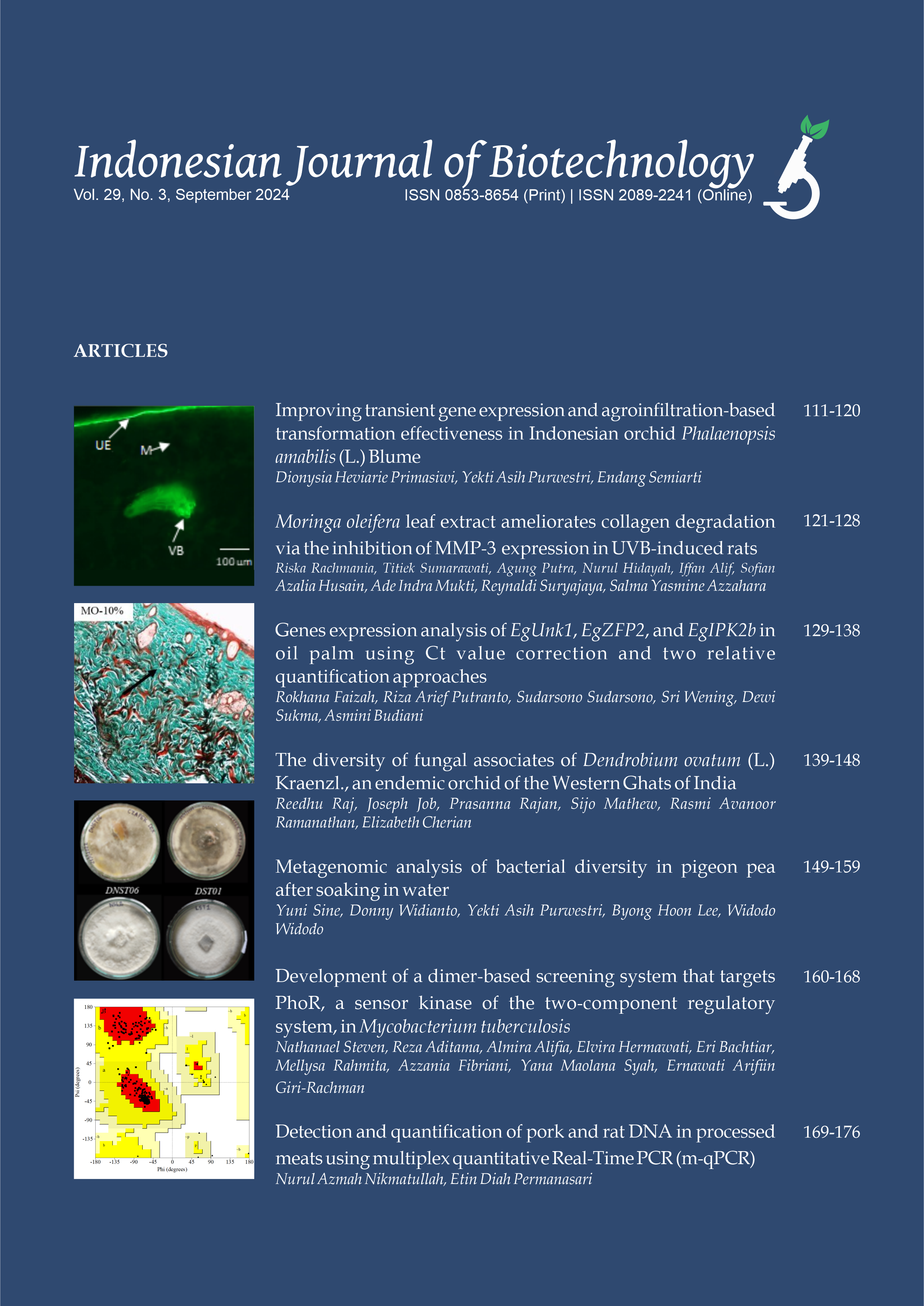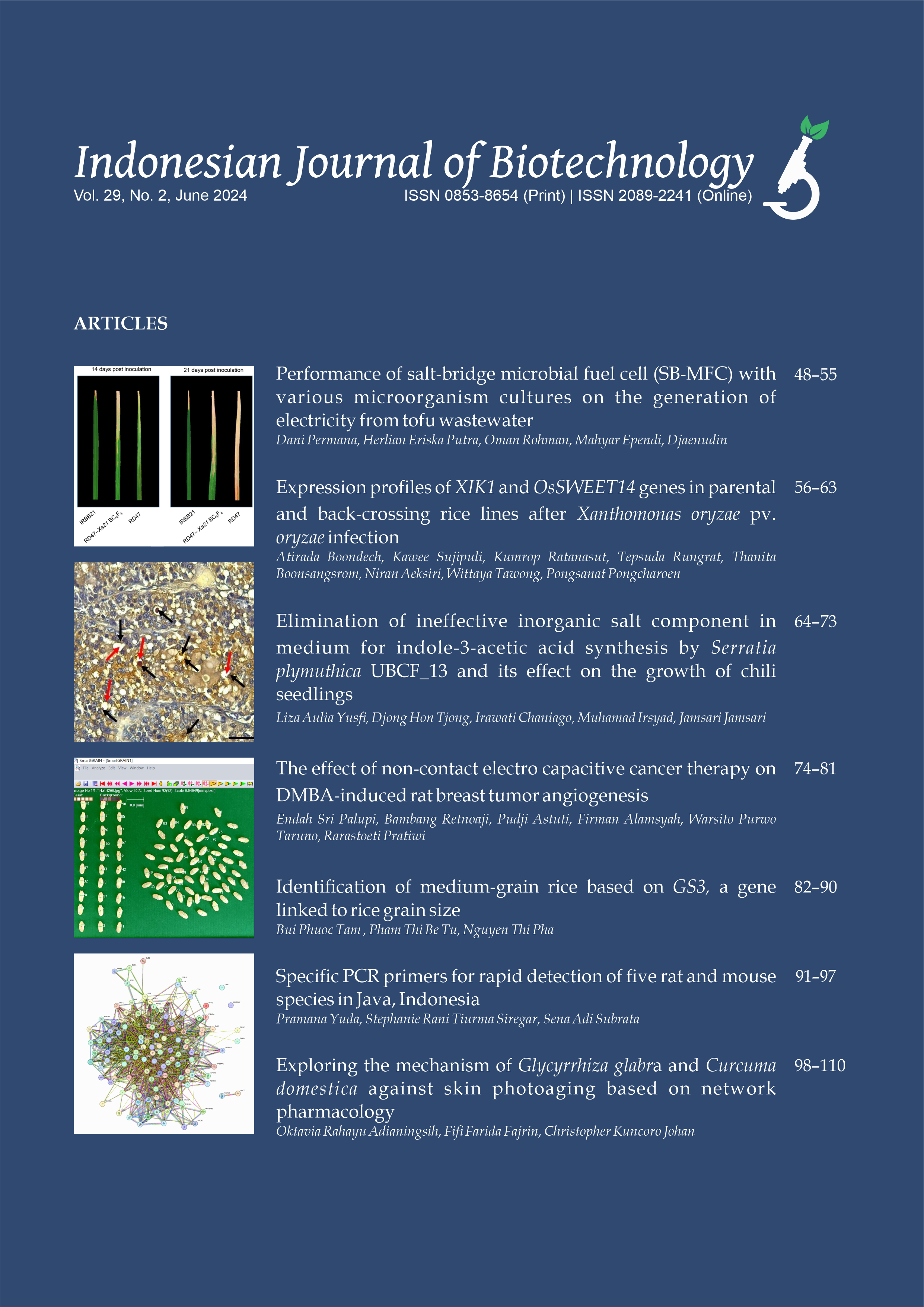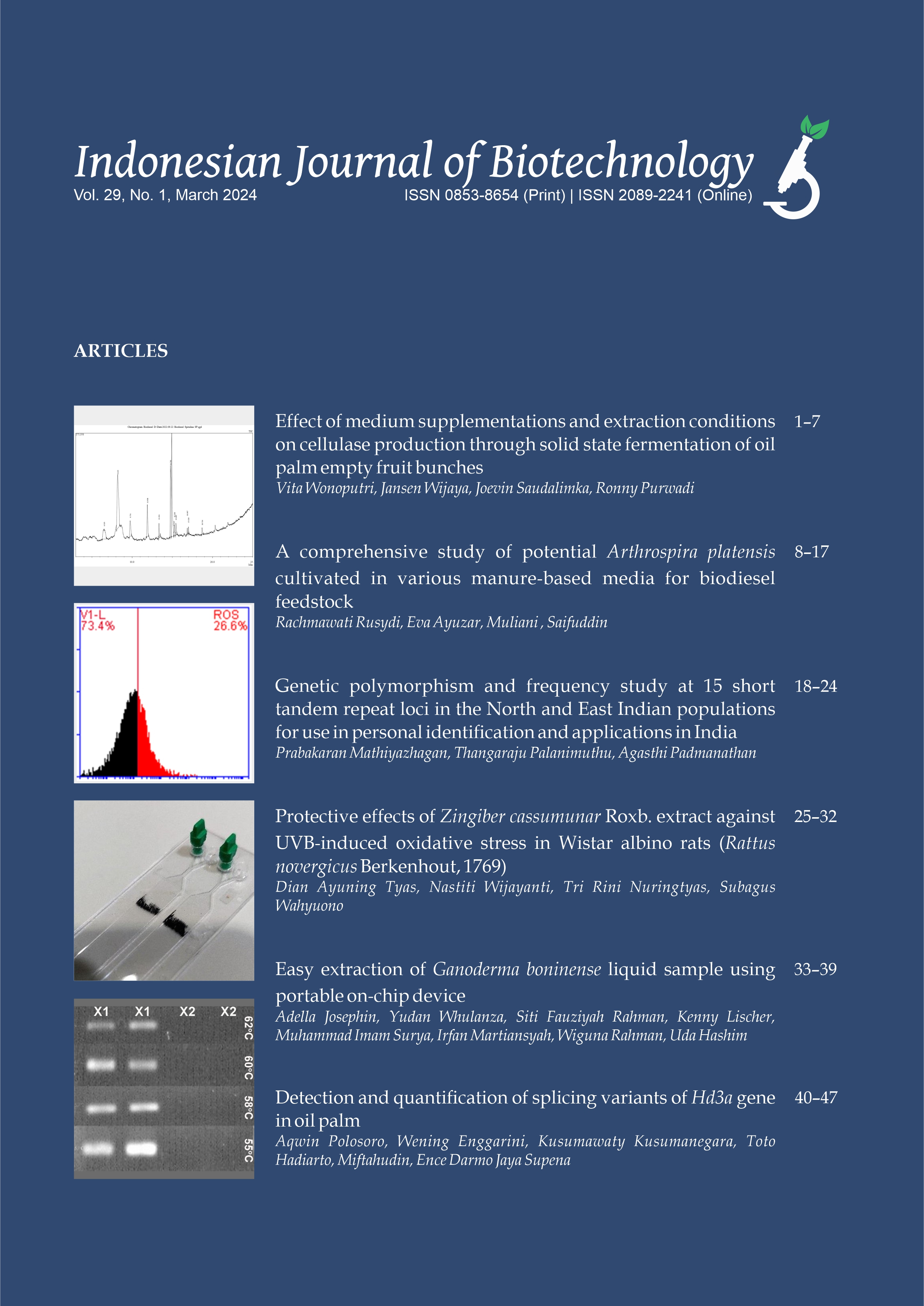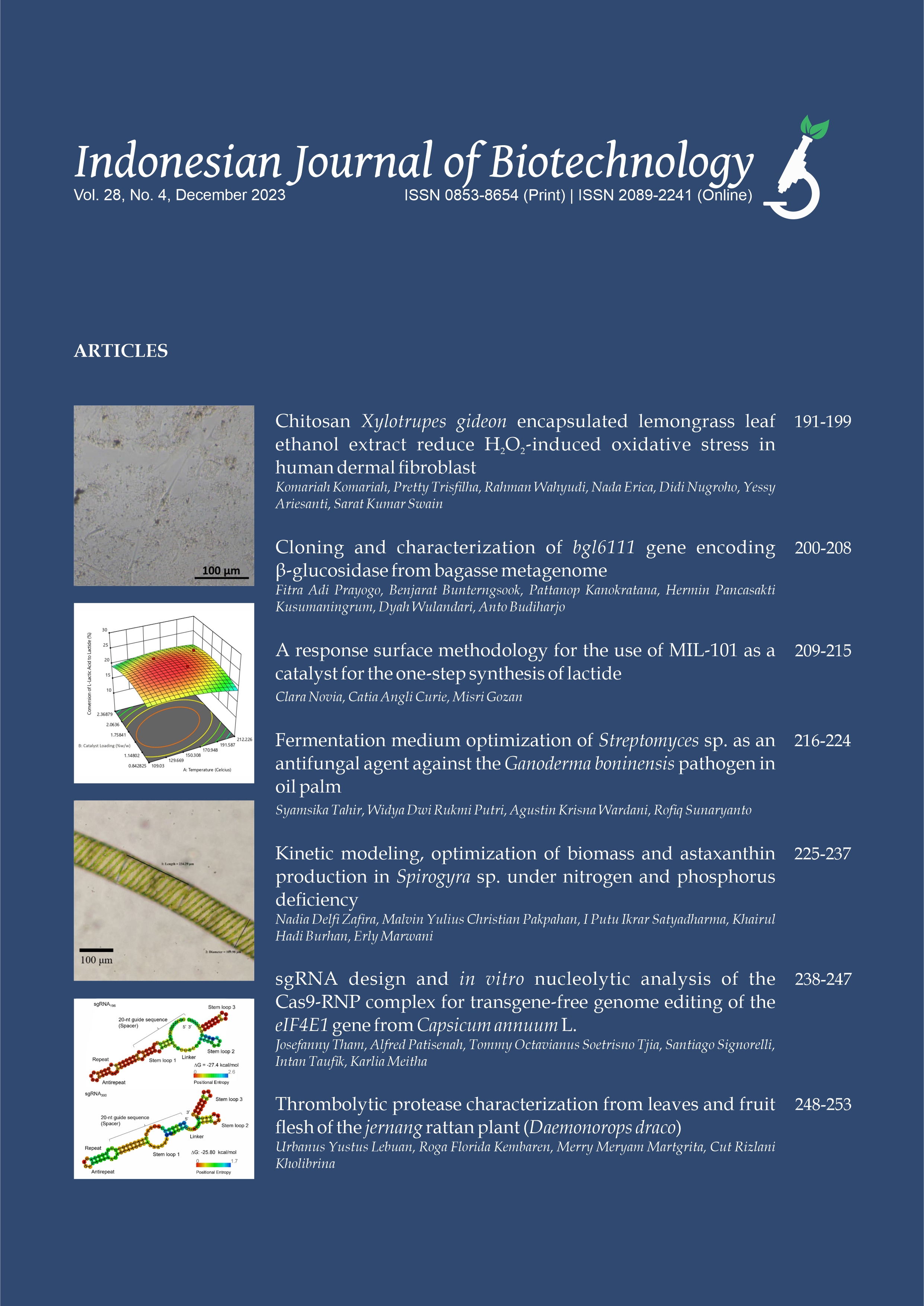Detection and identifcation of adherence genes of intestinal-origin Lactobacillus and Pediococcus strains grown on gastric mucin in vitro
W. Widodo(1*), Sri Lestari(2), Widya Asmara(3)
(1) Faculty of Animal Science, Universitas Gadjah Mada, Yogyakarta, Indonesia Research Centre for Biotechnology, Universitas Gadjah Mada, Yogyakarta, Indonesia
(2) Research Centre for Biotechnology, Universitas Gadjah Mada, Yogyakarta, Indonesia
(3) Research Centre for Biotechnology, Universitas Gadjah Mada, Yogyakarta, Indonesia Faculty of Veterinary Medicine, Universitas Gadjah Mada, Yogyakarta, Indonesia
(*) Corresponding Author
Abstract
Keywords
Full Text:
PDFReferences
Brassart, D. and Schiffrin, E. J. 2007 The use of probiotics to reinforce mucosal defence mechanism. Trends Food Sci. Tech.. 8: 321- 326. doi:10.1016/S0924-2244(97)01071-6
Boot, H. J., Kolen, C. P., van Noort, J. M. and Pouwels, P. H. 1993. S-layer protein of Lactobacillus acidophilus ATCC 4356: purification, expression in Eschericia coli and nucleotide sequence of the corresponding gene. J. Bacteriol. 175: 6089-6096.
Collins, R. L., Morsheimer, E. T., Shiffman, S., Paty, J. A., Gnys, M. and Papandonatos, G. D. 1998. Ecological momentary assessment in a behavioral drinking moderation training program. Exp. Clin.
Psychopharmacol. 6: 306-315. http:// dx.doi.org/10.1037/1064-1297.6.3.306
Drury, L.J., Ziarek, J.J., Gravel, S., Veldkamp, C.T., Takekoshi, T., Hwang, S.T., Heveker, N., Volkman, B.F., dan Dwinell, M.B. 2011. Monomeric and dimeric CXCL12 inhibit metastasis through distinct CXCR4
interactions and signaling pathways. PNAS 108: 17655-17660.
Dunne, C., Murphy, L., Flynn, S., O'Mahoney, L., O'Halloran, S., Feeney, M., Morrissey, D., Thornton, G., Fitzgerald, G., Daly, C., Kiely, B., Quigley, E. M. M., O'Sullivan, G. C., Shanahan, F. and Collins, J. K. 1999. Probiotics: from myth to reality. Demonstration of functionality in animal models of disease and in human clinical trials. Antonie van Leeuwenhoek 76: 279-292.
Favier, C. F., de Vos, W. M. and Akkermans, A. D. L. 2003. Development of bacterial and bifdobacterial communities in feces of newborn babies. Anaerobe 9: 219-29. doi:10.1016/j.anaerobe.2003.07.001
Gaucher, E. A., Miyamoto, M. M. and Benner, S. A. 2001. Function structure analysis of proteins using covarion based evolutionary approaches: elongation factors. PNAS 98: 548-552.
Granato, D., Bergonzelli, G. E., Pridmore, R. D., Marvin, L., Rouvet, M. and Corthesy-Theulaz, I. E. 2004. Cell surfaceassociated elongation factor Tu mediates the attachment of Lactobacillus johnsonii
NCC533 (La1) to human intestinal cells and mucins. Infect. Immun. 72: 2160-2169.
Greene, J. D. and Klaenhammer, T. R. 1994. Factors involved in adherence of lactobacilli to human Caco-2 cells. Appl. Environ. Microbiol. 60: 4487-4494.
Lahniten, S. and Ouwehand, A. 2009. Adhesion to Intestinal Mucus and Epithelium by Probiotics. In: Handbook of Probiotics and Prebiotics. Lee, Y. K. and Salminen, S. (eds.). John Wiley and Sons
Inc. Hoboken, New Jersey.
Lewandowska, M., Olejnik, A., Neumann, M., Krêpulec, A., Piotrowska, J., Teresiak, A., Grajek, W. 2005. Comparative in vitro study on the adhesion of probiotic and pathogenic bacteria to different human
intestinal cell lines. Biotechnologia 2: 215–233.
Ljungh, A. and Wadstrom, T. 2009. Lactobacillus Molecular Biology: From Genomics to Probiotics. Caister Academic Press. Norfolk, UK.
Margolles, A., Mayo, B. and Ruas-Madiedo, P. 2009. Screening, identification and characterization of Lactobacillus and Bifdobacterium strains. In: Handbook of Probiotics and Prebiotics. Lee, Y. K. and
Salminen, S. (eds.). John Wiley and Sons. Hoboken, New Jersey.
McGroarty, J. A. 1993, Probiotic use of lactobacilli in the human female urogenital tract. FEMS Immun. Med. Microbiol. 6: 251- 264. http://dx.doi.org/10.1111/j.1574-695X.1993.tb00337.x
Ramiah, K., van Reenen, C. A. and Dicks, L. M. 2009 Expression of the mucus adhesion gene mub, surface layer protein Slp and adhesion-like factor ef-Tu of Lactobacillus acidophilus ATCC 4356 under digestive stress conditions, as monitored with real-time PCR. Probiotic Antimicrob. Prot. 1: 91-95. DOI: 10.1007/s12602-009-9009-8
Ramiah, K., van Reenen, C. A. and Dicks, L. M. 2007. Expression of the mucus adhesion genes Mub and MapA, adhesion-like factor EF-Tu and bacteriosin gene plaA of Lactobacillus plantarum 423, monitored
with real-time PCR. Int. J. Food Microbiol., 116: 405 – 409.
Roos, S. and Jonsson, H. 2002. A highmolecular-mass cell-surface protein from Lactobacillus reuteri 1063 adheres to mucus components. Microbiology 148: 433-442. Saitou, N and Nei, M. 1987 The neighborjoining method: a new method for reconstructing phylogenetic trees. Mol. Biol. Evol. 4: 619-
629.
Sanchez, B., Saad, N., Schmitter, J-M., Bressollier, P. and Urdaci, M. C. 2010. Adhesive properties, extracellular protein production, and metabolism in the Lactobacillus rhamnosus GG strain when
grown in the presence of mucin. J. Microbiol. Biotechnol. 20: 978-984.
Tannock, G. W. (992. Lactic Microflora of Pigs, Mice and Rats. In: The Lactic Acid Bacteria. Volume 1: The Lactic Acid Bacteria in Health and Disease. Wood, B. J. B. (ed.). Elsevier Applied Science Publishers. London, UK. DOI: 10.1007/978-1-4615-3522-5_2
Turpin, W., Humblot, C., Noordine, M-L., Thomas, M. and Guyot, J-P. 2012. Lactobacillaceae and cell adhesion: genomic and functional screening. PLoS One 7 e38034. http://dx.doi.org/10.1371/journal.pone.0038034
Van Tassell, M. L. and Miller, M. J. 2011 Lactobacillus adhesion to mucus. Nutrients 3: 613-636. doi:10.3390/nu3050613
Vidgren, G., Palva, I., Pakkanen, R., Lounatmaa, K. and Palva, A. 1992. S-layer protein gene of Lactobacillus brevis: cloning by polymerase chain reaction and determination of the nucleotide sequence.
J. Bacteriol. 174: 7419-7427.
Widodo., Taufq, T. T., Aryati, E., Kurniawati, A. and Asmara, W. 2012a. Human origin Lactobacillus casei isolated from Indonesian infants demonstrating potential characteristics as probiotics in vitro. Indon. J. Biotechnol. 17: 79-89.
Widodo., Anindita, N. S., Taufq, T. T. and Wahyuningsih, T. D. 2012b. Identifcation of Pediococcus strains isolated from feces of Indonesian infants with in vitro capability to consume prebiotic inulin and to adhere on mucus. Indon. J. Biotechnol. 17: 132-143.
Widodo., Anindita, N. S., Taufq, T. T. and Wahyuningsih, T. D. 2014. Evaluation of two Lactobacillus strain as probiotics with emphasis in utilizing prebiotic inulin as energy source. Int. Res. J. Microbiol. 5:
33-40. DOI: http:/dx.doi.org/10.14303/irjm.2014.016.
Xu, H., Jeong, H.S., Lee, H.Y. and Ahn, J. 2009. Assessment of cell surface properties and adhesion potential of selected probiotic strains. Appl. Microbiol. Lett. 49: 434–442.
Article Metrics
Refbacks
- There are currently no refbacks.
Copyright (c) 2017 Indonesian Journal of Biotechnology

This work is licensed under a Creative Commons Attribution-ShareAlike 4.0 International License.









